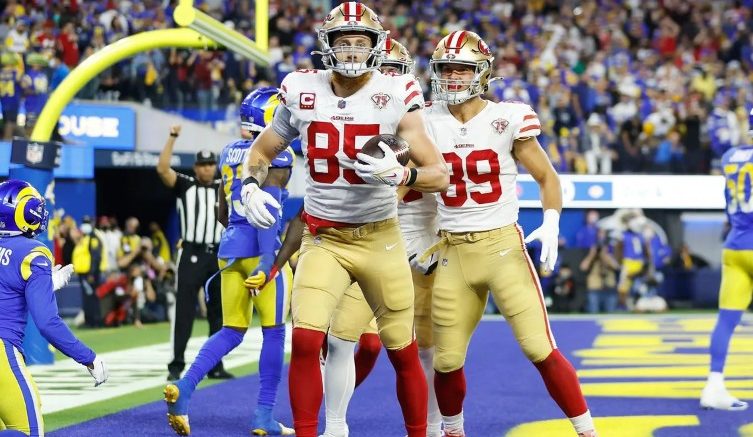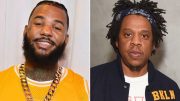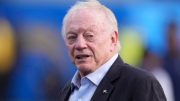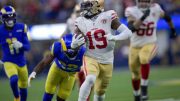The 49ers should trade George Kittle, according to Sports Illustrated…explain yourself.
The Twitter account of the San Francisco 49ers chose violence when it awoke this past Saturday.
With the 49ers coming off an appearance in the NFC Championship Game and a bright future ahead of them, Sports Illustrated writer Grant Cohn decided to serve up the spiciest of takes and declare that former All-Pro tight end George Kittle should be traded away as soon as possible.
Cohn is a terrific writer with some excellent content, but this is a huge F. Kittle is a critical component of the 49er’s attack, and dealing him in the middle of the team’s Super Bowl window would be a huge mistake.
Cohn lists ten reasons why trading Kittle might be a smart move. I’ll go over each point in-depth to see if it’s a good reason to trade Kittle.
1) “In the last two seasons, he’s missed 11 games.”
True, but Kittle’s ailments have only served to diminish his trade worth. Remember when Jimmy Garoppolo’s trade value was at an all-time low due to his inability to remain healthy a few years ago?
Prior to 2019, supporters hoped that the Niners would be able to trade him for a third-round pick. After just a few years, many would be surprised if they didn’t get a first. Despite the fact that he hasn’t played a full season since 2019, fans still expect a decent return for him.
Why are people so concerned about Kittle’s health while ignoring similar worries about other players? “Oh, because Garoppolo wins games when he’s healthy.” George Kittle, when healthy, is a game-winner as well!
His blocking ability alone would make him a valuable asset to any NFL club, but the fact that he can not only block you out of the game but also gain 100 yards via the air, makes him a game-changer.
Sure, he might miss a few games, but if you’re going to consider the drawbacks of his missing a quarter of the season, you should also consider the benefits. What if he participates in every game? He still has a lot of gas in the tank, and teaming him up with Deebo Samuel is always a good option.
2) “He was mostly injured the prior two seasons, even when he participated.”
And look at what he’s done. “Oh, but he only scored six touchdowns,” you could say. That’s the most he’s ever had in a season, but it’s never been an issue until now, has it?
Furthermore, this was Kittle’s most spread-out offensive since joining the league. Kittle had to split targets with an elite receiver for the first time, yet he still racked up 910 yards and six touchdowns. If he performed it while injured, I’d think to myself, “Wow!”
Imagine what he could do if we could just get him healthy.” Put your faith in the medical staff of the 49ers to get Kittle back to 100 percent before the season begins.
Oh, and in each of the last three seasons, Kittle has played more snaps than Deebo Samuel.
3) “His previous two injuries — a broken foot and a strained calf — were both caused by running. Kittle was sidelined for the whole 2021 season due to a leg injury.”
This is a compelling case. Kittle’s injuries were sustained in an unusual manner. Some people are born with glass bones and paper skin, and with Kittle now in his 30s, it’s easy to see him suffering a similar injury next season. However, Kittle’s value to the team is unaffected by his ailments.
The 49ers have gone 4-7 in the 11 games Kittle has missed over the last two seasons, with three of those wins coming against the Jets, Giants, and Bears. Those aren’t exactly difficult games, in my opinion.
When healthy, Kittle is one of those players who elevate the 49ers’ offense from mediocre to excellent. Yes, he’s paid well, but he still looks terrific when he’s on the field, and if he’s been playing hurt, as Cohn claims, that only adds to his ceiling.
He may be much better, and as long as the 49ers’ Super Bowl window remains open, which it will for a few more years, betting on Kittle staying healthy for most of the season isn’t a bad bet.
4) “The 49ers paid Kittle $16 million a season because they thought he’d be the No. 1 option in their passing game, but Deebo Samuel is now the No. 1 option, Brandon Aiyuk is the second option, and Kittle, when healthy, is the third option.”
The first portion is simple to comprehend. No, no, no, no, no, no, no, no, no, no, no During the remaining three weeks of the regular season, Kittle only saw twelve targets and missed three games. Despite this, he saw 10 more targets than Aiyuk.
Yes, Aiyuk’s role in the 49ers’ passing attack grew as the season proceeded, but that was most likely due to Deebo Samuel’s presence. As Samuel began to line up in the backfield more frequently, Aiyuk’s number one wide receiver duties were increasingly placed on his shoulders.
If Samuel’s position in the backfield is reduced next season — which is quite likely if the 49ers re-sign Raheem Mostert and start giving Trey Sermon touches — Aiyuk will return to his lower role in the offense.
Of then, who knows what kind of production we’ll get from Kittle if he gets well. Next year’s defenses will be focused on Samuel, so a healthy Kittle might exceed everyone’s expectations.
To have an efficient passing assault, you need a trustworthy number two option, and while Aiyuk is brilliant, he hasn’t shown the consistency required to shoulder that load. Outside of Samuel, Kittle is still the most dependable passing option.
5) “Everything Kittle does as a receiver, including running after the catch, Samuel and Aiyuk do better.” Samuel had a 10.4 YAC per catch average last season, Aiyuk had a 6.6 YAC per catch average, and Kittle had a 6.5 YAC per catch average.”
YAC is a useful stat, but it isn’t the be-all and end-all of determining a player’s excellence. Halfback Austin Ekeler (625 YAC) of the Chargers had more YAC than Justin Jefferson (485).
Is this to say that Ekeler is the better receiver? No. Jefferson is clearly a better receiver in every way, but the two functioned in their own systems in different ways.
They each had a distinct function. Ekeler frequently received passes behind the line of scrimmage and was racking up YAC before returning to the down marker, whereas Jefferson worked in a more intermediate region.
In this case, the same argument applies to Kittle. Unlike Aiyuk and Samuel, who have plays built expressly for them to get into the open field and swerve around defenders for YAC, Kittle does not have such plays. Hitches and 10-yard ins are his specialties.
The types of plays in which linebackers rush up to you and hit you right away. Because Aiyuk lines up against corners, he may face stronger coverage than Kittle, but Aiyuk will more often than not have an easier job dodging defenders in his neighborhood than Kittle.
Furthermore, Samuel and Aiyuk are both significantly speedier than Kittle, so I expect them to gain more yardage after the catch.
Kittle isn’t the same type of receiver as Aiyuk or Samuel, so he shouldn’t be compared to them. Would you judge Samuel based on his ability to run block?
6) “The 49ers don’t throw the ball to Kittle often enough to justify paying him like a No. 1 wideout.”
No. They don’t have any. He’s right here, but this is a first-world problem in football terms. Finally, the 49ers have an elite receiver on their roster, so they aren’t as likely to send the ball to Kittle as they once were. Wow, how unfortunate for the Niners! Allow me to play you a mournful melody on the world’s tiniest violin.
Consider the possibility that the Baltimore Ravens sign Chris Godwin this offseason. I’m not predicting it will happen. I’m simply putting up a show here.
Chris Godwin would be the team’s best wide receiver by a long shot. As a result, he’d have a lot of targets. Mark Andrews’ target share drops unexpectedly…oh terrible! Terrible! Clearly, the Ravens aren’t throwing enough to him to justify paying him like a top-five tight end. Relax; there aren’t enough targets to keep everyone fed at all times.
What? You thought Kyle Shanahan would make Jimmy G drop back 45 times each game just so Kittle could get more targets? No way! They’re a run-heavy team that prioritizes YAC. In 2021, Kittle was primarily used as a safety net for Garoppolo in the event that the defense targeted Samuel.
Keep in mind that Kittle had 27 receptions for 379 yards and four touchdowns in the four games in which Samuel either missed or received less than five targets. Who is Trey Lance going to start looking at if Deebo gets hurt? Aiyuk? Please.
Kittle isn’t just a fantastic safety net for a young quarterback; he’s also the 49ers’ lone player who has shown he can handle the workload of a No. 1 option in the passing game.
7) “Kittle isn’t quite as good as he was when his contract was extended.”
Yes, this is how contract extensions operate, and why so many athletes choose multi-year contracts over one-year ones. They seek job security, even if their performance deteriorates marginally.
Do you believe DeAndre Hopkins is still as good as he was when he was moved from the Houston Texans to the Arizona Cardinals? No. So, Arizona, I guess it’s time to move on, huh? In the middle of the Super Bowl window, you don’t deal away from your star players. You simply don’t.
And, guess what, every other team in the league is seeing Kittle’s dip in production as well. But I’m sure they’re willing to pay a lot of money for Kittle’s potential. If the 49ers are hesitant to match those fees for the same potential, trade him away.
However, you must acknowledge that the potential for Kittle to go completely insane still exists, which is why he is so highly regarded. It’s not my fault you don’t think he’ll do it.
8) “If the 49ers move Kittle now, they could certainly get a late first-round pick or a Pro Bowl cornerback like Xavien Howard in return.”
Yes, the 49ers require assistance in the secondary. Xavien Howard is an excellent cornerback. The 49ers, on the other hand, require funds. The 49ers will face a dead cap charge of $28.9 million if they deal with Kittle.
If they trade for Xavien Howard, they will be responsible for Howard’s $16.3 million caps hit as well as $28 million in salary over the next two years. This is a monetary wombo combination that would be more powerful than a MAC truck. It just does not work.
Even if Kittle plays like garbage this year and the 49ers need to get rid of him, doing so after the 2022 season would make the most sense.
9) “If Kittle has another injury-plagued season, the 49ers will likely be unable to move him and his $16 million-per-season contract, as everyone will view him as a damaged good on the verge of a career-ending injury.”
I mean, don’t I get the impression that Cohn already believes this of Kittle? We can, however, play the “if” game all day. What if Kittle is able to recapture his 2018 form? Suddenly, keeping him seemed like a great idea. “Of course,” you say, “but what if he doesn’t?” It’s a never-ending circle.
Kittle isn’t to blame. Cohn continues to stare at him as if he were a half-empty glass. Kittle possesses the exceptional talent and has as high a ceiling as any tight end not named Travis Kelce. Yes, his floor is low, but that’s due to injuries, and as I mentioned in the previous section, if that becomes an issue in 2022, he has a built-in out.
“However, why not do it right now to prevent the risk?” Because the 49ers are still within their Super Bowl window! They’re upgrading at quarterback while freeing up a ton of cap room by releasing Garoppolo, and they’re keeping all of their key players from last year’s NFC Championship run.
No matter how injury-prone, that’s not a team that should be giving away one of the best tight-end prospects in the league.
10) “This year, Kittle will turn 29.”
Travis Kelce celebrates his 33rd birthday this year. Darren Waller celebrates his 30th birthday. Rob Gronkowski is 33 years old, and yes, even in a loaded offense, he was quite effective while healthy last year.
Tight ends don’t have the same 30-year window as running backs or wide receivers. To be effective, tight ends don’t need to maintain their speed or elusiveness. They usually stay at the top of their game as long as they can block and catch the ball well.
After all, left tackle Trent Williams of the 49ers is 34 years old this year and hasn’t lost a stride. Kittle is a really gifted blocker, even if that’s all he can do. If that’s all he can accomplish, should he be paid $16 million a year?
No, but as I previously stated, his contract with the 49ers expires after next season. If he appears to be slowing down, now is the moment to drop him.
In a zone-run strategy, having a slew of excellent blocks is never a bad thing. Kittle can at the very least provide a significant boost in that area, which should not be underestimated in an attack that will feature a second-year running back and a second-year quarterback in 2022.
Trey Lance cost Shanahan and John Lynch three first-round picks, so they should want to preserve him at all costs. Kittle provides excellent protection and a reliable pair of hands for Lance to rely on in an emergency. With so many years of elite football remaining to be played, trading Kittle is a terrible decision.
“It’s better to make a trade one year early than one year late,” as the saying goes, but with a club as talented as San Francisco’s, keeping the guys that push you over the top should be your first goal.





